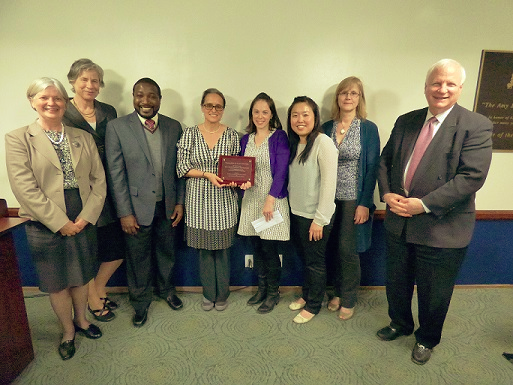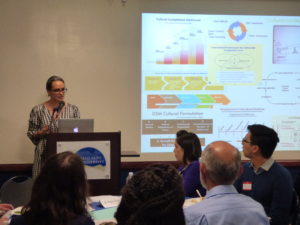 Each year since 2010, Palo Alto University brings recognition to Bay Area programs which demonstrate commitment to promoting cultural awareness and competence in the training of doctoral students in clinical psychology. On April 13, 2017, the Center for Excellence in Diversity Award was presented to Partnerships for Trauma Recovery (PTR) for its efforts to train clinical interns in globally culturally aware and contextually adapted care for refugees, asylees and asylum seekers. This recognition by the Center for Excellence in Diversity not only reflects PTR’s commitment to cultural diversity, but also gives due attention to the diverse populations of international survivors of human rights abuses who have sought refuge in the Bay Area.
Each year since 2010, Palo Alto University brings recognition to Bay Area programs which demonstrate commitment to promoting cultural awareness and competence in the training of doctoral students in clinical psychology. On April 13, 2017, the Center for Excellence in Diversity Award was presented to Partnerships for Trauma Recovery (PTR) for its efforts to train clinical interns in globally culturally aware and contextually adapted care for refugees, asylees and asylum seekers. This recognition by the Center for Excellence in Diversity not only reflects PTR’s commitment to cultural diversity, but also gives due attention to the diverse populations of international survivors of human rights abuses who have sought refuge in the Bay Area.
PTR’s Clinical and Training Director, Dr. Annika Sridharan, states, “Partnerships for Trauma Recovery defines culture through an international lens, with a broad global perspective. We understand culture as consisting of the totality of environments and social contexts in which human beings develop, and engage with others and the world. Culture includes social groups’ beliefs, values, customs and identity, which are related to their historical, political and economic contexts; geographical location and climate; linguistic, ethnic, racial and national characteristics; religious and spiritual beliefs; gender and sexual identities; political beliefs; dynamics of power and oppression; and more. We understand culture as constantly in flux, and as being composed of multiple subcultures which interact with and influence one another. Culture, like identity, is a complex and fluid concept which evolves as time and history unfold, and individuals and groups develop and change.”
In a world in which the need for psychosocial care is expanding, PTR’s attention to the trauma of those escaping unjust persecution and human rights abuses is essential. In 2016, the United Nations High Commissioner for Refugees reported that global forced displacement had reached a record high of 65.3 million people. Often, along with this forced displacement come experiences of severe violence and trauma which can affect people’s ability to rebuild their lives. This is where PTR can help, by giving people the opportunity to process their trauma and losses, and thus better access opportunities available in their new host country.
 Already having provided care for clients from 26 different countries – and with capacity to do so in 25+ languages – PTR adopts a globally culturally aware approach to meeting the diverse needs of international survivors in the Bay Area. A core component of PTR’s model is the Global Healing and Human Rights Clinical Training Program which expands capacity among graduate students in clinical psychology and social work to serve this population. “Each trainee works with an extremely diverse group of clients, often with no two clients from the same country,” explains Dr. Sridharan. “A trainee might for example see an Afghan family with young children; an Eritrean single mother; a young Congolese man; a Syrian couple; a gay man from Uganda; a disabled Yemeni torture survivor; an indigenous grandmother from Guatemala; and an unaccompanied youth from El Salvador. Some clients are from extremely poor rural backgrounds and have never been to school, while others may be highly educated from comfortable backgrounds in capital cities. Clients might be Muslim, Orthodox Christian, Hindu or Buddhist. They can be transgender and Muslim, or Catholic and gay.” The diversity of refugee and asylum seeking communities who come to the United States seeking safety from around the world is limitless, and PTR thanks Palo Alto University’s Center for Excellence in Diversity for the honor of this meaningful award, and for its continued support of Bay Area organizations dedicated to the values of peace and inclusion.
Already having provided care for clients from 26 different countries – and with capacity to do so in 25+ languages – PTR adopts a globally culturally aware approach to meeting the diverse needs of international survivors in the Bay Area. A core component of PTR’s model is the Global Healing and Human Rights Clinical Training Program which expands capacity among graduate students in clinical psychology and social work to serve this population. “Each trainee works with an extremely diverse group of clients, often with no two clients from the same country,” explains Dr. Sridharan. “A trainee might for example see an Afghan family with young children; an Eritrean single mother; a young Congolese man; a Syrian couple; a gay man from Uganda; a disabled Yemeni torture survivor; an indigenous grandmother from Guatemala; and an unaccompanied youth from El Salvador. Some clients are from extremely poor rural backgrounds and have never been to school, while others may be highly educated from comfortable backgrounds in capital cities. Clients might be Muslim, Orthodox Christian, Hindu or Buddhist. They can be transgender and Muslim, or Catholic and gay.” The diversity of refugee and asylum seeking communities who come to the United States seeking safety from around the world is limitless, and PTR thanks Palo Alto University’s Center for Excellence in Diversity for the honor of this meaningful award, and for its continued support of Bay Area organizations dedicated to the values of peace and inclusion.
